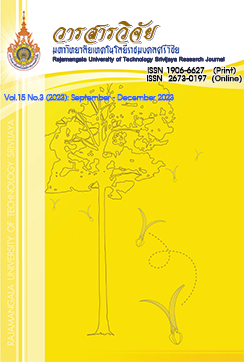An Experimental Study on Characteristics of Condensation Lid for Thermosyphon-type Solar Energy Ethanol Distillation Tank on Distillation Performance
Keywords:
condensation, lid flat plate solar collector, ethanol distillation chamberAbstract
This research study examined the condensation cap characteristics of the ethanol distillation performance using solar radiation as a heat source and a passive greenhouse drying cabinet enclosed by a 17-degree tilting glass sheet. Size 1.25 × 1.8 × 1 m3 joined with a flat plate solar collector size 0.75 × 1.35 m3 as a heat source to boil the volatile low-concentration ethanol solution through condensation to get a higher concentration. Ethanol solution at the initial concentration of 10% v/v and a volume of 10 liters was used. There were 3 cases in all experiments: Case 1, an inverted funnel cap distillation tank, where the ethanol solution was directly passed through a flat plate solar collector and condensed through a copper pipe outside the incubator. Case 2, a distillation tank with a conical lid facing up and condensed water is constantly circulating on the lid of the tank. Case 3, a distillation tank with a conical lid of a conical distillation tank has condensed water circulating on the lid of the tank at intervals. At 30 minutes/time, the average solar radiation on the day of the experiment was 18.30 MJ/m2/day. The results showed that in Case 1, the distillation capacity could produce 1.51 liters of ethanol/day at a concentration of 30% v/v. For Case 2, the distillation capacity can produce 3.02 liters of ethanol/day at a concentration of 39% v/v and in Case 3, distillation capacity can produce ethanol 3.37 liters/day at a concentration of 41% v/v from the test found. From the experiment in Case 3, it was found that the lid of the conical distillation tank had condensed water swirling on the lid of the tank at intervals of 30 min/time, resulting in the condensed water having no rotation to exchange heat with the ethanol solution in the distillation tank all the time. The experiments were conducted to achieve the highest water density at low temperatures with the highest sedimentation efficiency. The order of performance, from highest to lowest, is as follows: Case 3, followed by Case 2, and then Case 1.
References
ASHRAE, Standard 93-2003. 2003. Methods of Testing to Determine the Thermal Performance of Solar Collectors, pp. 2-7. In American Society of Heating, Refrigeration, and Air Conditioning Engineers. New York.
Duffie, J.A. and Beckman, W.A. 1991. Solar Engineering of Thermal Processes. John Wiley and Sons, New York.
Hong, J., Voloch, M., Ladisch, M.R. and Tsao, G.T. 1982. Adsorption of Ethanol-Water Mixtures by Biomass Materials. Biotechnology Bio Engineering 24(3): 725-730.
Jareanjit, J., Tiansuwan, J., Amornkitbamrung, M and Kiatsiriroat, T. 2004. Comparison study on ethanol distillation performance using evacuated-heat pipe and flat-plate solar collectors, pp. 5-10. In 3rd CMU Annual Conference on Heat & Mass Transfer (21-22 August 2004). Chiang Mai, Thailand. (in Thai)
Jareanjit, J., Tiansuwan, J., Terdyothin, A., Tia, W., Thavarungkul, N and Siangsukone, P. 2008. Comparison Study on Ethanol Distillation Performance Using Water and Heat Transfer Oil are Working Fluids, pp. 181-185. In 7th CMU Annual Conference on Heat & Mass Transfer (13-14 March 2008). Chiang Mai, Thailand. (in Thai)
Jareanjit, J., Siangsukone, P., Wongwailikit, K. and Tiansuwan, J. 2014. Development of A Mathematical Model and Simulation of MassTransfer of Solar Ethanol Distillation in Modified Brewery Tank. Applied Thermal Engineering 73(1): 723-731.
Jareanjit, J., Siangsukone, P., Wongwailikit, K. and Tiansuwan, J. 2015. Management of Ethanol Waste from The Solar Distillation Process: Experimental and Theoretical Studies. Energy Conversion and Management 89: 330-338.
Jorapur, R.M. and Rajvanshi, A.K. 1991. Alcohol Distillation by Solar Energy, pp. 772-777. In Solar World Congress Proceedings. Pergamon Press, ISES.
Meukam, P., Njomo, D., Gbane, A. and Toure, S. 2004. Experimental Optimization of a Solar still: Application to Alcohol Distillation. Chemical Engineering and Processing: Process Intensification 43(12): 1569-1577.
Minmin, W., Siping, D., Li, D. and Xuefen, W. 2022. PPy nanotubes-enabled in-situ heating nanofibrous composite membrane for solar-driven membrane distillation. Separation and Purification Technology 281: 119995.
Perry, R.H. and Grenn, D.W. 1984. Perry’s Chemical Engineers’ Handbook. McGraw-Hill, New York.
Rabelo, S.C., Carrere, H., Filho, R.M. and Costa, A.C. 2011. Production of bioethanol, methane and heat from sugarcane bagasse in a biorefinery concept. Bioresource Technology 102(17): 7887-7895.
Robertson, G.H., Doyle, L.R. and Pavlath, A.E. 1983. Intensive Use of Biomass Feedstock in Ethanol Conversion: The Alcohol-Water, Vaper-Phase Separation. Biotechnology and Bioengineering 25(12): 3133-3148.
Sarkar, N., Ghosh, S.K., Bannerjee, S. and Aikat, K. 2012. Bioethanol production from agricultural wastes: An overview. Renewable Energy 37(1): 19-27.
Siangsukone, P., Jareanjit, J., Therdyothin, A., Tia, W., Wongwailikit, K. and Tiansuwan, J. 2008. Development of Solar Ethanol Distillation System for Thai Local Community, pp. 1-7. In Proceedings of The 8th ASEAN Science and Technology Week Scientific and Technical Conferences (3-4 July 2008). Pasay City, Philippines.
Therdyothin, A., Sriroth, K., Kiatsiriroat, T. and Tiansuwan, J. 2006. Research Report on Pilot Project for Cost Reduction of Ethanol Production Using Solar Energy. National Research Council of Thailand, Bangkok. (in Thai)
Tiwari, G.N., Singh, H.N. and Tripathi, R. 2003. Present Status of Solar Distillation. Solar Energy 75(5): 367-373.
Toe, W.K. and Ruthven, D.M. 1986. Adsorption of Water from Aqueous Ethanol Using 3-A Molecular Sieves. Industrial & Engineering Chemistry Process Design and Development 25(1) :17-21.
Vorayos, N., Kiatsiriroat, T., Vorayos, N. and Kongboon, P. 2003. Mathematical and Experimental Studies of a Batch-Type Solar Ethanol Distiller, pp. 479-486. In The Proceeding of the 2nd Regional Conference on Energy Technology towards a Clean Environment. Phuket. (in Thai)
Downloads
Published
How to Cite
Issue
Section
License
Copyright (c) 2023 Rajamangala University of Technology Srivijaya Research Journal

This work is licensed under a Creative Commons Attribution-NonCommercial-NoDerivatives 4.0 International License.
The content and information in the article published in Journal of Rajamangala University of Technology Srivijaya It is the opinion and responsibility of the author of the article. The editorial journals do not need to agree. Or share any responsibility.







